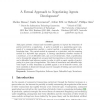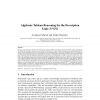662 search results - page 89 / 133 » Logic Programming with Ordered Disjunction |
ECRA
2002
13 years 7 months ago
2002
This paper presents a formal and executable approach to capture the behaviour of parties involved in a negotiation. A party is modeled as a negotiating agent composed of a communi...
ICFP
2010
ACM
13 years 7 months ago
2010
ACM
Most current techniques fail to achieve the dynamic update of recursive functions. A focus on execution states appears to be essential in order to implement dynamic update in this...
ICALP
2004
Springer
14 years 1 months ago
2004
Springer
Monadic least fixed point logic MLFP is a natural logic whose expressiveness lies between that of first-order logic FO and monadic second-order logic MSO. In this paper we take ...
JAPLL
2010
13 years 6 months ago
2010
Semantic web applications based on the web ontology language (OWL) often require the use of numbers in class descriptions for expressing cardinality restrictions on properties or ...
AGP
1994
IEEE
13 years 11 months ago
1994
IEEE
Kowalski and Sergot's Event Calculus (EC) is a formalism for reasoning about time and change in a logic programming framework. From a description of events which occur in the...


